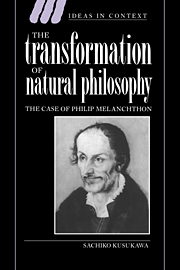
- Publisher:
- Cambridge University Press
- Online publication date:
- November 2009
- Print publication year:
- 1995
- Online ISBN:
- 9780511598524
- Series:
- Ideas in Context (34)

This book proposes that Philip Melanchthon was responsible for transforming traditional university natural philosophy into a specifically Lutheran one. Motivated by desire to check civil disobedience and promote a Lutheran orthodoxy, he created a natural philosophy based on Aristotle, Galen and Plato, incorporating contemporary findings of Copernicus and Vesalius. The fields of astrology, anatomy, botany and mathematics all constituted a natural philosophy in which Melanchthon wished to demonstrate God's Providential design in the physical world. Rather than dichotomizing or synthesizing the two distinct areas of 'science' and 'religion', Kusukawa advocates the need to look at 'Natural philosophy' as a discipline quite different from either 'modern science' or 'religion': a contextual assessment of the implication of the Lutheran Reformation on university education, particularly on natural philosophy.
‘… Kusukawa’s book and her analysis of Melanchthon’s thought offer a valuable contribution to our understanding of the influence of the Reformation.’
Source: British Journal for the History of Science
 Loading metrics...
Loading metrics...
* Views captured on Cambridge Core between #date#. This data will be updated every 24 hours.
Usage data cannot currently be displayed.
Accessibility compliance for the PDF of this book is currently unknown and may be updated in the future.